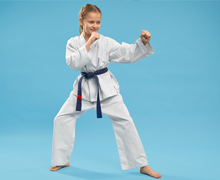
Parents looking for a way to help their children cope with the mental anguish associated with isolation, school closures and lockdowns during the pandemic may want to consider a martial arts program. That’s because researchers at the University of Surrey in England found the practice of Taekwondo in school-aged children resulted in better self-regulation, which meant they could better manage and alter their emotions, behavior and cognition.
Studies shows good self-regulation is also associated with positive mental health benefits and higher academic achievement in children.
Researchers worked with school children in grades 3-6. There were two groups for each grade and they were randomly assigned. The Taekwondo experimental group participated in two 45-minute Taekwondo classes each week for 10 weeks. The control group participated in 45-minute PE classes during the same time.
A baseline was established for each child by collecting data a week before the trial began. The students were then tested after the exercise period was over. Questionnaires were completed by the children to determine how much importance they placed on behaviors related to good self-control. Their teachers were asked to complete questionnaires regarding their assessment of a child’s self-regulation at school. There were also computer tasks designed to assess a range of mental processes called executive functions that enable self-regulation.
The teachers rated the children in the Taekwondo experimental group as having better attentional capacity than those in the PE classes as well as better executive attention as assessed by the Flanker Task, as test that measures concentration.
The Taekwondo classes were well-received by the students and led them to place a higher value on self-control. The study also found it reduced symptoms of conduct disorders.
"A large body of research suggests that there are substantial personal and public benefits to improving children's self-control, however, research is less clear on how to achieve this in practical terms," Dr. Terry Ng-Knight, from the University of Surrey's School of Psychology said. "Our findings suggest that including traditional martial arts in schools could both teach children the value of self-control and increase their use of self-regulation. Traditional martial arts are popular extra-curricular activities for many children, however their use in schools appears to be quite limited at present."
Click here to read more in the journal Developmental Psychology.
